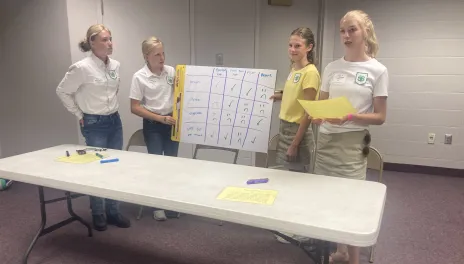Youth Build Life Skills Through 4-H Consumer Decision Making Contest
In today’s world, we are constantly faced with decisions, from mundane choices about what to eat or wear to more significant decisions about purchases or life choices. Effective decision making is an important lifelong skill.
The North Dakota 4-H Consumer Decision Making Contest is designed to equip young people with the skills they need to make informed decisions. As they prepare for the contest, they learn to evaluate and compare options, rank them based on standards and quality, and defend their decisions.
During the contest, the participants evaluate and rank four similar items in several categories. For each category, they receive a hypothetical situation and criteria to use when evaluating the four items. After ranking the items, they must provide reasons for their decisions.
In addition, teams participate in a group evaluation component. Each team receives the same scenario and has 10 minutes to collaboratively evaluate the situation and make a final decision based on given standards. Teams are scored on how well they work together and present their solution.
“Consumer Decision Making Contests have helped me learn important life skills like managing my time and money,” says Ingrid Myrdal, member of the Spirit 4-H Club in Walsh County. “I have noticed when I shop now, I have used these skills when deciding where I want to eat and shop, especially during back-to-school shopping. The more I participate in the contest the more I have gained and learned.”
The decision-making skills youth develop through the 4-H Consumer Decision Making Contest translate directly to everyday problem solving, according to Meagan Hoffman, youth development specialist for NDSU Extension’s Center for 4-H Youth Development.
“The problem-solving and collaboration skills developed through contests like Consumer Decision Making will be important as they transition into adulthood,” Hoffman says.
FOR MORE INFORMATION
Meagan Hoffman, 701-231-7964, meagan.scott@ndsu.edu
